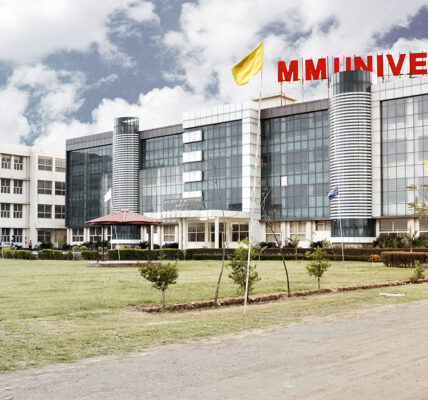Introduction
No. 1 Boarding School, Ambala, is located in the middle of the Ambala district, Haryana, which is considered to be one of the leading boarding schools in the area. Famous in its academic discipline and character growth, contemporary facilities and supportive atmosphere, this school is designed to prepare learners not to pass their exams, but to live their lives. The school attracts students not only in the neighbouring districts but also in the more distant ones with an atmosphere of integrity, discipline, and innovation.
History & Vision
As a relatively newcomer in the industry, No. 1 Boarding School has gained popularity quite quickly because of its narrow-minded leadership and faculty, the constant motivation to improve the infrastructure. The core value that it practices is the idea of holistic development- balancing intellectual development with physical, emotional, social and moral development.
The school’s vision includes:
Enabling students to be self-reliant, strong and socially responsive.
Provision of international standard facilities and still maintaining the local cultural values.
Ensuring that the classes are small enough to allow the teachers to provide personal attention.
Development of international consciousness through exposure to both the traditional and modern modes of learning.
Academic Program
Curriculum & Affiliations
The school is also a member of CBSE (Central Board of Secondary Education) making it in line with national academic standards.
It provides courses between Grade I (or Pre-Primary) to Grade XII, with Senior Secondary streams of Science, Commerce and Arts.
The language of instruction is English, with mandatory use of Hindi and optional use of regional or foreign languages, according to the need.
Teaching & Assessment
The teachers are qualified teachers who have been trained and certified, most of them with post graduate qualifications and experience.
Student-to-teacher ratio is maintained at a manageable level (e.g. 25-30 students in a class) in order to promote clarity and interaction.
Evaluation is ongoing: formative (tests, projects, assignments monthly), summative (quarterly and half-year examinations). The focus is on learning as opposed to memorization.
Routine remedial instruction of students requiring assistance in certain subjects, and enrichment of those students excelling.
Boarding Life
Campus & Hostel Facilities
Large dormitories with baths; hostels boy and girl. Rooms can be shared or individual, which is based on grade and fee structure.
Dining hall that provides healthy, balanced food; service to vegetarian, non-vegetarian, and special dietary requirements.
Recreation common rooms, study halls where they can study in the evenings, and chill-out areas where they can relax.
24 hours security with CCTV, caretakers, wardens and medical personnel on call.
Daily Routine
Organized schedule: rising early, morning assembly, classes with break, lunch, sports or co-curricular activities, evening study, dinner, personal time, lights out.
Competencies that are taught include regular discipline, punctuality, and self-care. Students are taught how to manage time, how to take care of things, cooperation with peers, and so on.
Co-curricular/ Extracurricular Enrichment.
Sports: big fields / courts: cricket, football, basketball, volleyball, athletics; indoor sports such as table-tennis, chess, badminton. Ambala has also some boarding schools that have swimming pools.
Arts and Culture: music, song, drama, visual arts, debate, oratory. Annual performances, events and competition.
Clubs and Activities: Science club, robotics, language clubs, environmental club, etc.
Life Skills and Leadership: The students are trained on leadership (prefects, student council), community service, orientation programs, personality development workshops.
Infrastructure & Amenities
Properly furnished classrooms with smart boards, projectors.
Modern equipment in science laboratories (Physics, Chemistry, Biology).
Computer Lab, Library containing nice collection of books, magazines, online material.
Infirmary / medical room having visiting doctor and simple emergency treatment.
Day scholar transportation facilities.
WiFi / internet access to study digitally (with hostellers under strict supervision).
Admissions & Fees
The process of admission normally begins with an application form, and then entrance test / interview to determine academic preparedness and suitability to the boarding life.
Notable papers: past academic history, birth certificate, medical certificate.
The fee structure is usually on an annual basis and comprises of tuition, boarding and lodging, meals, uniforms, extra-curricular activities. The fees differ greatly based on the grade, accommodation type (shared or single), facilities and even nationality (in the case of non-Indian or international students).
Scholarships or reduction of fees can be given on merit or need basis.
Strengths & Reputation
A good academic track record, where students are regularly scoring high in board exams, joining good colleges.
Well trained and nurturing faculty also serving as mentors.
The focus on the development of the character- discipline, integrity, confidence.
Good student support, and safe environment of hostellers.
Parents have positive feedback regarding the general development: academic, social, physical.
Obstacles and Strengths to Work on.
Expense: Boarding schools are not cheap; the increased fee arrangements are not affordable to all families.
Homesickness / adaptation: Students who travel long distances may allow some time to be spent adapting. The school requires good pastoral care.
Infrastructure maintenance: Hostels, sports facilities, labs: There should always be investment in infrastructure.
Living between tradition and modernity: Implementing the new teaching techniques and technology without affecting the local culture and values.
Health and safety issues particularly during pandemic times: hygiene, medical response should be strong.
Local and Regional Education Role.
No. 1 Boarding School is not only an educational facility, but also a community centre:
It draws talents in and out of rural and urban Ambala, where I have boarding facilities, the students do not need to travel in or go home.
It aids in decreasing educational migration: families tend to place their children in large cities; these schools make quality education domestically.
Employs teachers, employees and helps the local economy.
Future Aspirations
Increase facilities: increasing labs and hostel facilities and recreational facilities.
Introduce increased external exposure: exchange programs, international curriculum choice, co-operation with international institutions.
Expand scholarship / social outreach programs to assist less fortunate students.
Bring in increased greenness: green campus, solar energy, recycling, organic gardens.
Embrace technology further: online courses, e-learning, digital libraries, smart classes, and so on.
Frequently Asked Questions (FAQ)
In what age should a child be sent to a boarding school?
Students who are Class III or IV and above (8-10) generally adapt more. Nevertheless, there are schools that are open to younger, based on the maturity and preparedness of the child. Emotional maturity and the readiness to be away home is important to consider.
Does it make No. 1 Boarding School, Ambala, a co-ed?
Yes, nearly all the present day boarding schools, in Ambala, are co-ed, that is, boys and girls do not reside in the same hostels, but attend the same schools. Check with the particular school because policies are different.
What are the fees that I should expect?
Fees can range quite a bit:
To younger classes, common, less equipped: lower side.
In the case of senior classes, superior hostel amenities (single rooms, AC etc.), superior labs, special programs: superior.
The cost of day-cum-boarding or day boarding schools in Ambala can be less than the full boarding. According to the recent statistics, fees of many boarding / daycum boarding schools are between [?]1.5-3 lakhs/year or higher (based on facilities). (Again, varies widely.)
Ezyschooling
+2
BoardingSchoolService.com
+2
What are the items that a student needs to carry?
A list will be given in school, but usually: uniforms (more than one set), school shoes, plain stationery, weather clothing, toiletries, bed linen (where needed), personal effects. Entertainment stuff as well – books, stationery, perhaps gadgets as needed.
What is the management of health and safety?
The good boarding schools have medical rooms where doctors come, regular checkups, first aid and maybe tie ups with local hospitals. Security involves secure facilities, oversight, fire safety, emergency plans. In a school, parents should always enquire about these.
What do schools do in order to take care of homesick students?
By means of mentoring, frequent contact with parents, counselling, peer support. Warden or hostel-incharge must be friendly. Most schools hold weekend or monthly review meetings, letters/calls home and activities to ensure that the students maintain contact with family.
Are extracurriculars obligatory?
Usually yes. Boarding schools do not believe in the separation of development hence sports, arts, clubs are included in the day-to-day life. There is difference in intensity and variety.
How is it selected / admitted?
Common procedures: application – fill formapplication – entrance test or examination depending on the level – application interview or interaction with the child and parents – documentation- offer of admission – fee payment and confirmation of hostel. The schedule and criteria of each school are different.
In what school book or book syllabus board do we have?
Ambala has most boarding schools that are associated with CBSE. Others can also provide international curriculums such as Cambridge or ICSE besides CBSE. Syllabus will cover normal subjects, co-curricular material, life skills. Books are ordered according to board; book lists are frequently published in advance by schools.
Are parents allowed to visit their ward any time?
Visiting policies vary: there are usually regular day(s)/time of visit, which are used mostly with younger students. More flexibility can be given to senior students, however hostel regulations should be observed. Parents ought to explain to school in advance.



